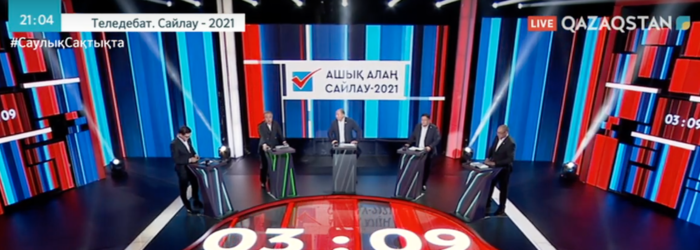NUR-SULTAN – Qazaqstan national TV channel aired the Dec. 22 televised debates between the representatives of the five parties participating in the elections to the Mazhilis, the lower chamber of the Kazakh Parliament, set for Jan. 10, 2021.

The main topic of the debates was national values and ideology. Gaziz Kulakhmetov represented the People’s Party of Kazakhstan, Aidos Sarym – Nur Otan party, Dauletkerey Kapuly – Auyl (Village in Kazakh) national democratic party, Berik Duisenbinov – Ak Zhol (White Way) party, and Maksat Tolykbai – Adal (Faithful) party – all have their answers.
The debates had four segments. First, on the debate stage, the party representatives spoke about their party programs, outlined priorities, and answered questions from the hosts. Then, they debated each other and responded to questions from citizens and in the last segment, each had a chance to address the people.
Speaking first, Dauletkerey Kapuly from the Auyl national democratic party said that defining an ideology going forward is a priority now, rather than focusing on specific social and economic issues. “Without a right national ideology, the country’s development strategy can not be implemented,” he said.
Aidos Sarym from the Nur Otan party said big reforms are on their way in Kazakhstan, which is currently facing a difficult period stemming from the coronavirus pandemic.
“The main goal of our generation is to think of future generations and preserve our country for them, and eventually pass the leadership of an independent state to them. There is no better dream than that,” he said.
He also emphasized the importance of having a strong state.
“Only a strong state can implement big reforms. Only a strong state will pass the big test. (…) Our party has changed and upgraded. And now we need to change the state as well,” said Sarym.
Berik Duisenbinov from the Ak Zhol party stressed the importance of sovereignty and independence.
“We should not lag behind other countries. Our citizens should be educated, rich, and strong. Economic independence has the potential to become the country’s national idea,” said Duisenbinov.
He suggested strengthening the parliament, ensuring state bodies are accountable to the public, including the revenues of national and quasi-state companies into the state budget, and decriminalizing economic offenses.
Gaziz Kulakhmetov from the National Party of Kazakhstan said the country’s education and healthcare system requires major reforms. The number of state programs should be cut, he added.
“The tax burden should first be on rich people. The state apparatus must be reformed. The number of government officials should be decreased,” he said listing his party’s priorities.
Maksat Tolykbai from the Adal party spoke about the rise in unemployed youth in rural areas, as one of the problems his party seeks to address.
“They want to do business, but they don’t have money. The state should increase grants up to two-three million tenge (US$4,730-US$7,095). The interest rate for entrepreneurs should be decreased to six percent and the loan collateral-free. Any bank would give five million tenge (US$11,824) to organize a wedding, but when it comes to opening a business and asking for 10 million tenge (US$23,649), they require collateral,” said Tolykbai.
Yerlan Madiyev, an expert at the Kazakh Institute of World Economy and Politics, noted the informal setting of the debates and participation of party representatives from the non-governmental sector, which was unusual for Kazakhstan in previous years.
“Finally, and most importantly, there was a very honest and open, yet constructive, dialogue. These aspects reflect the qualitative changes in party competition in the country, which resulted from this year’s process of reloading the party and political landscape of the country. The party lists of candidates have been renewed, approaches to campaigning and working with voters have changed, and political parties are willing to raise the most urgent issues on the country’s agenda,” Madiyev told The Astana Times.
Elections to the Mazhilis and Maslikhats will take place on Jan. 10 next year. The nomination process lasted through Nov. 10-30, while the political campaign started Dec. 10 and lasts through Jan. 9.
Kazakhstan’s Central Election Commission registered five political parties and confirmed all party lists that complied with the requirements of the Kazakh constitution. There are a total of 312 candidates from five political parties, of which 113 are from the People’s Party of Kazakhstan, Nur Otan ruling party – 126, Auyl (Village) – 19, Ak Zhol (White Way) – 38, and Adal (Honest) – 16. The Assembly of the People of Kazakhstan also nominated nine candidates.
The parties will appear on a ballot in this order based on a random draw.
